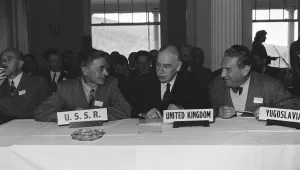International Security is America's leading peer-reviewed journal of security affairs.
This policy brief is based on "Pyongyang's Survival Strategy: Tools of Authoritarian Control in North Korea," which appears in the Summer 2010 issue of International Security.
Bottom Lines
- The Challenge of Succession. Kim Jong-il's hold on power in North Korea seems more secure than many pundits suggest. The regime does not appear vulnerable to coups d'états or revolution. The greatest threat to the regime is the challenge of succession.
- Hardly an Erratic Regime. The Kim regime's foreign policy behavior, though frequently called erratic or crazy, has a rational basis. International provocations help to stoke popular nationalism, shoring up the regime’s domestic position, particularly within the military.
- The Paradox of Sanctions. Effective sanctions—those that target Kim's power base—are likely to be rejected by key stakeholder countries because of the risk they pose of regime collapse and the chaos that would likely ensue.
The Staying Power of the Kim Regime
Predictions of the Kim regime's demise have been widespread for many years, particularly in the 1990s, as upwards of 1 million North Koreans perished in a famine. Limited openness in the form of bustling markets and some cross-border trade were viewed as a possible threat to the regime's control. Recently, analysts have argued that North Korean bellicosity—for example, the March 2010 attack on a South Korean warship and its nuclear and missile tests in 2009—is aimed at a domestic audience: an effort by a weak regime to shore up support among the North Korean military in advance of succession. Analysts also point to surprising popular protests after Pyongyang's botched 2009 currency reform and to increased information flows as reasons to think the regime may soon fall.
Decisionmakers and analysts, however, often underestimate the power of tyranny. Like other dictatorships, the Kim regime relies on numerous tools of authoritarian control to stay in power.
Although data are opaque, Kim Jong-il's hold on power seems more secure than many pundits suggest: the regime does not appear vulnerable to coups d'état or revolution. The greatest threat to the Kim regime is the challenge of succession. Prior to his death in 1994, Kim Il-sung skillfully applied a variety of tools from the "authoritarian toolbox" to ensure a smooth transfer of power for his son—for example, creating a cult of personality around the younger Kim. The current regime has not yet made similar preparations for Kim Jong-il's successor, which raises the risk of contested succession and regime collapse after Kim's death or incapacitation.
Understanding the Kim regime's resilience requires an understanding of the tools it has used to stay in power. The first is social engineering—creating a country where the very building blocks of opposition are lacking. North Korea has no merchant or land-owning class, independent unions, or clergy. Intellectuals are regime-loyal bureaucrats, not dissidents, and strict restrictions on the activities of students have cowed them into submission.
Second, the regime pushes an ideology. The Supreme Leader (suryong) system established Kim Il-sung as the center of a cult of personality. At the core of the regime's juche ideology is nationalism with a xenophobic, even racist, slant. Anti-Japanese sentiment, hostility to South Korea, and propaganda against the United States create legitimacy for the regime. As the regime inculcates its ideology and cult of personality, it strives for tighter controls on information. In the 1990s, after the famine, the regime's control of information decreased and cross-border smuggling grew, but recently the regime has tried to reassert its control.
Perhaps most important, the North Korean regime is brutal in its use of force. Dissent is detected through an elaborate network of informants working for multiple internal security agencies. People accused of relatively minor offenses undergo "reeducation"; those accused of more serious transgressions are either immediately executed or interred in miserable political prison camps. Even more daunting, according to the "three generations" policy, the regime punishes not only the individual responsible for the transgressions but his or her whole family.
At the same time, Kim Jong-il uses perks and rewards to co-opt military and political elites. Members of this class receive more and better food, in addition to the most desirable jobs working for the regime. During the famine, the core class was protected, so that the famine's devastation was concentrated on the people deemed least loyal. This group acquiesced to the succession of Kim Jong-il after his father's death; it keeps Kim in power and will influence his choice of successor. Kim Jong-il has co-opted the military by bestowing on it policy influence and prestige, as well as a large share—perhaps 25 percent—of the national budget. The military also has a favored position in policy circles and is lauded in regime propaganda. Nuclear weapons provide another tool for cultivating the military's support. They bring prestige to an institution whose morale has been challenged by hunger and by its relative inferiority to South Korea's military forces.
Kim Jong-il's regime manipulates foreign governments to generate the hard currency needed to buy off elites and sustain his military. China and the Soviet Union propped up North Korea during Kim Il-sung's reign. Kim Jong-il continues to rely on Chinese patronage, but he has also been adept at extracting extensive aid from his adversaries. Since the late 1990s, Pyongyang has used promises of denuclearization to extort more than $6 billion in aid, as well as hundreds of thousands of tons of food, not only from South Korea but also from the United States, China, and Japan. Economic initiatives associated with South Korea's sunshine policy, such as the Kaesong Industrial Complex, have also provided Pyongyang with a significant revenue stream. Although Seoul initially announced cuts in this economic support after the March 2010 attack on the South Korean warship, only a few months later it began to backtrack.
Should co-optation fail and domestic elites grow dissatisfied, the Kim regime has coup-proofed North Korean institutions in ways that deter, detect, and thwart anti-regime activity among these elites. North Korean military leaders are chosen for their political loyalty rather than military competence. Key positions are granted to individuals with family or other close ties. Kim Il-sung ruled with the help of relatives and his fellow anti-Japanese guerrillas. Kim Jong-il relies on multiple and competing internal security agencies to reduce the unity of the security forces and to maximize the information he receives about anti-regime activities. The Kim regime has created parallel security forces to protect itself from a military coup.
Implications and Policy Recommendations
This analysis suggests several implications for foreign policy toward North Korea, in particular the effort to pressure Pyongyang to give up its nuclear arsenal. Sanctions aimed at weakening North Korea's broader economy are unlikely to exert much coercive pressure on Pyongyang; Kim Jong-il (like Joseph Stalin, Saddam Hussein, and many other dictators) protects his elite core while shifting the burden of sanctions to the people. A more effective economic lever with which to move the regime would be to directly threaten its access to hard currency and luxury goods, which it needs to bribe elites. Policies such as freezing North Korean assets overseas and embargoing luxury items are thus the most promising options.
Ironically, the United States and other countries will be hesitant to apply the kinds of sanctions that have the best chance of success. In China, South Korea, and the United States, fears of war or chaos on the Korean Peninsula and the calamity of refugees pouring across borders are likely to lead these states to continue to prop up the Kim regime, helping it to weather crises and keeping the country poor, starved, and brutalized.
North Korea is unlikely to yield to pressure to relinquish its nuclear arsenal. Although much debate focuses on the regime's security motivations for acquiring nuclear weapons, these weapons also serve as a tool of its survival. They help to curry the favor of the military, and they provide a bargaining chip that earns the regime billions of dollars in hard currency.
In contrast to the media, which persist in portraying Kim Jong-il as a madman or an incompetent playboy, this analysis shows him to be a shrewd, if reprehensible, leader. His meticulous use of the authoritarian toolbox reveals him to be a skilled strategic player. Kim shows every sign of being rational—and thus deterrable.
Should the United States reject a deterrence strategy toward North Korea (as it ultimately did toward Iraq), limited military operations undertaken with the goal of inciting a coup or popular revolt are unlikely to succeed in this coup-proofed dictatorship. Air strikes would do little to stir up popular unrest or sufficient anger among the military elite to topple Pyongyang's regime. Rather, they would inflame nationalism at the popular level and likely increase the military's loyalty to the leadership. Kim's regime would be able to blame any resulting economic problems on the bombings rather than on its own bungling. Toppling the Kim regime, then, is unlikely to work with coercive strikes and would instead require a full invasion, a course the United States is unlikely to choose because of the tremendous instability it would unleash.
Related Resources
Armstrong, Charles K. The North Korean Revolution 1945–1950. Ithaca: Cornell University Press, 2003.
Cha, Victor D., and David C. Kang. Nuclear North Korea: A Debate on Engagement Strategies. New York: Columbia University Press, 2005.
Cumings, Bruce. North Korea: Another Country. New York: New Press, 2004.
Demick, Barbara. Nothing to Envy: Ordinary Lives in North Korea. New York: Spiegel and Grau, 2003.
Haggard, Stephan, and Marcus Noland. Famine in North Korea: Markets, Aid, and Reform. New York: Columbia University Press, 2007.
Harrison, Selig. Korean Endgame: A Strategy for Reunification and U.S. Disengagement. Princeton: Princeton University Press, 2000.
Lankov, Andrei. North of the DMZ: Essays on Daily Life in North Korea. Jefferson, N.C.: Macfarlane, 2007.
Lind, Jennifer. "Next of Kim." Foreign Policy, June 2009.
International Security is America’s leading peer-reviewed journal of security affairs. It provides sophisticated analyses of contemporary, theoretical, and historical security issues.
International Security is edited at Harvard Kennedy School’s Belfer Center for Science and International Affairs and is published by The MIT Press.
For more information about this publication, please contact the International Security publications coordinator at 617-495-1914.
Statements and views expressed in this policy brief are solely those of the authors and do not imply endorsement by Harvard University, the Harvard Kennedy School, or the Belfer Center for Science and International Affairs.
Byman, Daniel and Jennifer Lind. “Keeping Kim: How North Korea's Regime Stays in Power.” July 2010





